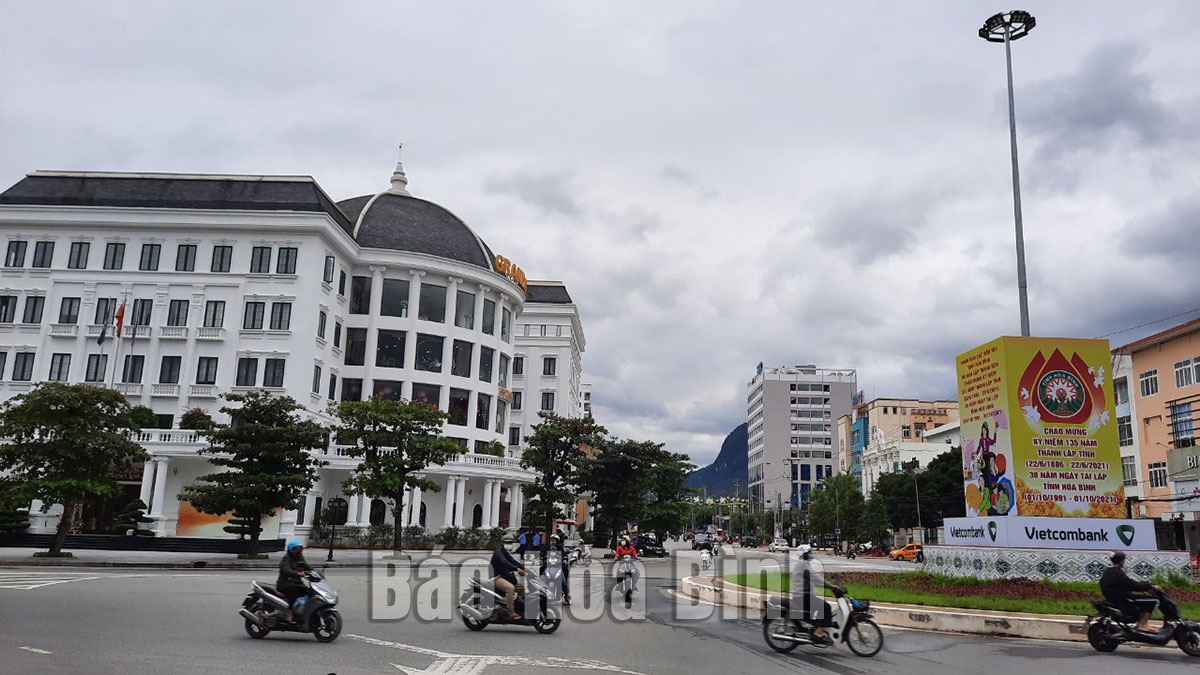
(HBO) – Hoa Binh province has witnessed a strong development of infrastructure facilities serving trade, tourism, culture and services in recent years, which has contributed to improving the spiritual life of local people.
The improvement of infrastructure system in the locality is hoped to contribute to turning tourism and service into spearhead economic sectors of the locality.
 A modern shopping centre on the left bank of the Da River in Hoa Binh city.
A modern shopping centre on the left bank of the Da River in Hoa Binh city.
In recent times, urban, commerce and service infrastructure in all localities in the province have changed markedly. Hoa Binh city has mobilised thousands of billions of dong to invest in infrastructure development and implement a series of urban embellishment, traffic, trade and tourism projects.
Investment projects in transport infrastructure, including bridges across the Da River, open up new chances to expand Hoa Binh city. Trade and services account for an increasingly high proportion in the province’s economic structure.
Many important projects such as the roads connecting Hoa Lac (Hanoi) with Hoa Binh city and National Highway 6 with Chi Lang Street, Road 435, and Hoa Binh Bridges No. 2 and 3, were put into use.
The local authorities have enhanced investment promotion activities and encouraged organizations and individuals to pour investment into eco-tourism, resort, spiritual culture tourism projects. It has attracted investment in eco-tourism destinations such as Mai Chau Hideaway, Mai Chai Ecolodge, Ba Khan Village Resort in Mai Chau district; Sunset Villa and Resort in Luong Son district; and Serena Resort in Kim Boi district.
Many community-based tourism areas were developed in the area around Hoa Binh Lake, including Duc Phong village, Sung village and Ke village in Da Bac district, and Ngoi village in Tan Lac district.
In 2020, the province had 434 accommodation establishments, including six three-star hotels, 25 two-star hotels, 8 one-star hotels, 238 hostels, 157 homestays with a total of 4,000 rooms. It is home to 9 local tourism areas, one provincial-level tourism site, 13 travel firms. The number of tourists and total revenue from tourism activities in the province have consistently increased, averaging over 10 percent a year.
So far, all the ten districts of Hoa Binh province and Hoa Binh city have had culture, sports and information centres, communal houses and stadiums. The province has a total of 120 communal houses and community learning centres in communes, wards and towns; and 1,630 communal houses and 1,172 sports grounds in villages, hamlets, residential quarters and residential areas.
Local commercial and service activities have developed strongly. The province has nearly 1,000 businesses, and about 30,000 business households. The province is also home to many reputable agents and distributors, which provide quality products meeting the demand of local people.
Cargo and passenger transport services have also developed rapidly. Tourism service has gradually become an important economic sector of the locality./.
Hoa Binh province has harnessed its rich cultural heritage and human potential to forge the path towards sustainable development in the new era.
In Hoa Binh province, 11 traditional craft villages with more than 400 small-scaled production households have put in place a clean and green production model, establishing new standards for sustainable development. Waste collection sites and wastewater treatment facilities have been meticulously managed by local residents.
To make it easier for the residents to handle administrative procedures, Yen Bong Commune (Lac Thuy District) has identified the administrative reform as one of its key tasks. By implementing a range of synchronized solutions, the commune has seen the positive changes in the administrative reform, meeting the needs of its people.
Mai Chau district has firmly established itself as a standout destination on Vietnam’s tourism map, attracting both domestic and international visitors with its breathtaking landscapes, rich ethnic culture, and warm hospitality. However, beyond its natural and cultural charm, a secure and well-managed tourism environment has added to Mai Chau’s appeal.
As Vietnam enters a new phase of economic and administrative reform in 2025, Hoa Binh province is stepping up its efforts to streamline governance, boost economic growth, and attract investment.
The Hoa Binh provincial People's Committee held its monthly meeting on March 26 to review the progress of key projects, assess budget revenue and public investment disbursement, provide feedback on draft documents for submission to the provincial Party Committee's Standing Board, and discuss other important matters related to the committee's governance activities.



 A modern shopping centre on the left bank of the Da River in Hoa Binh city.
A modern shopping centre on the left bank of the Da River in Hoa Binh city.